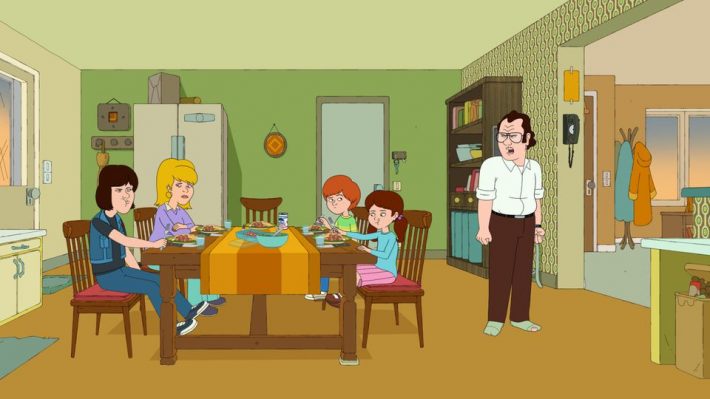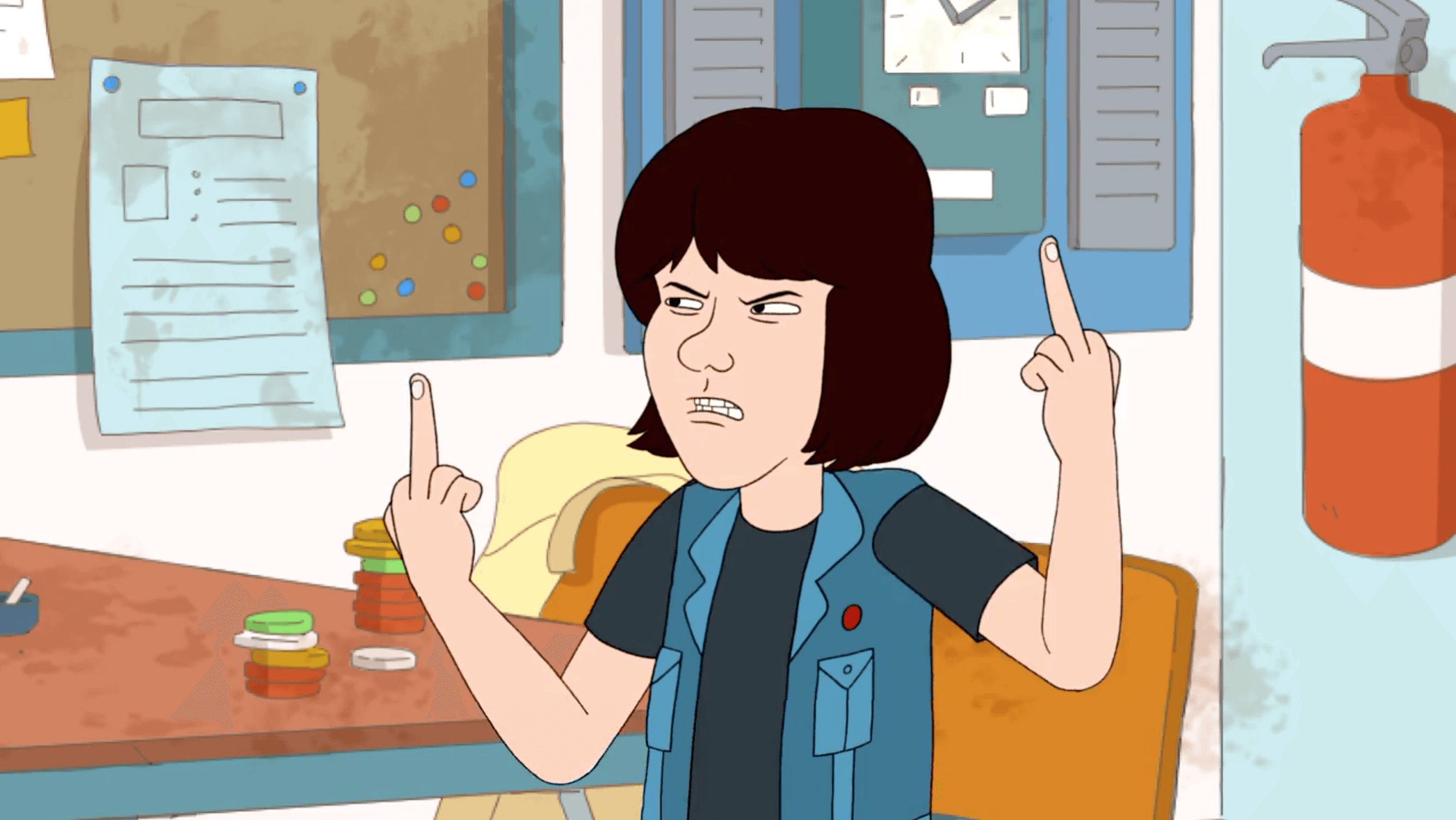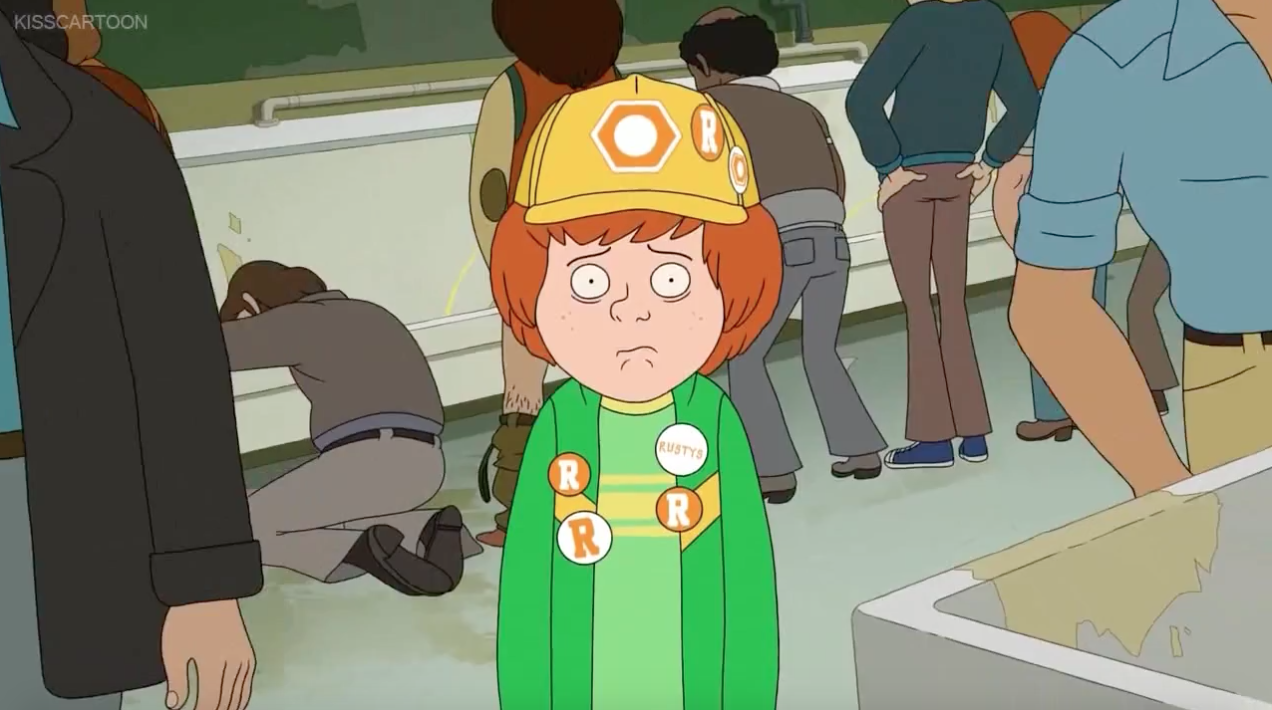(This was originally posted last year on The Solute. With F Is For Family season 3 debuting Friday, November 30, I thought this would be a good time to re-share this.)
There’s a bit in Bill Burr’s outstanding 2014 Netflix standup special, I’m Sorry You Feel That Way, where he discusses his upbringing. Specifically, he talks about how his mother used to never hug him, and she eventually explained that “Your father was afraid it would turn you kids gay.” This seems to be a setup for an easy joke about how toxic masculinity gets passed on from generation to generation, but Burr digs deeper:
I’m gonna defend my dad here, because this is basically what happens when you have a kid … if you have a fuckin’ kid, what do you want to do? You want to improve on your childhood. Okay? You want to keep the shit that your parents did that worked, and then you want to get rid of the stuff that didn’t work.
So that was my dad– as fucked up as that was– that was his improvement on his childhood that he never talks about, the way a veteran never talks about going to war.
So I figure, if that was his improvement on his childhood, then his childhood just must have been something like:
“Don’t change his shitty diaper. Let him figure it out himself! GET OUT IN THE RAIN, YOU SHITTY BABY! Hey, let me handle this, lady! WHY ARE YOU STILL STANDING HERE, YOU SHIT TODDLER?!”
So he took it from that… and knocked it down to, “Don’t hug him, it’s gonna make him gay.”
Burr pushes past the easy joke to try to put himself in his father’s shoes, and the reward is much richer.
It’s that same of sense of empathy, for his father specifically — a man it would be easy to write off as just another angry white male– and for humanity in general, that drives Burr’s animated Netflix sitcom F Is For Family, returning for its second season on May 30. (A six-episode first season was released in December 2015; season two will consist of ten episodes.)
Through a long and distinguished standup career that includes six recorded specials, the 48-year-old Burr– especially on his more recent efforts such as the one above and this year’s Walk Your Way Out— has proven himself to be one of the best observers of human nature currently working a microphone, able to, as he does in the above bit, deliver a unique perspective by finding empathy for people in situations where it’s easier, and more self-gratifying, to write those people off. (I’m Sorry You Feel That Way contains bits about Donald Sterling and Duck Dynasty’s Phil Robertson; on the other side, 2010’s Let It Go examines the way men pressure each other into suppressing their feelings and sensitivities– an idea expressed by, among others, bell hooks– and the effects of that: “[It’s] the reason why guys drop at 55 out of fuckin’ nowhere… it’s literally from five decades of just suppressing the urge to, like, hug a puppy, admit a baby’s cute, say you want a cookie… you just gotta keep pushing it down…”)
F Is For Family is roughly based on Burr’s childhood; set in 1973, the protagonist of the show is Murphy patriarch Frank (voiced by Burr), an over-stressed powder keg perpetually on the verge of exploding. (Indeed, we see him do so in the series’ very first scene, going off on a telemarketer who’s interrupted family dinner, one of Frank’s few moments of peace in the day.) Despite that, Burr, co-creator Michael Price, and the rest of the writing staff continually find that same empathy for Frank and show him not as a punchline but as a real three-dimensional character.
The opening credits of F Is For Family, more than perhaps any other show on television right now, demonstrate the show’s perspective on Frank and the depth with which he will be portrayed. Set to Redbone’s “Come and Get Your Love,” we see Frank Murphy’s adult life summed up in 30 seconds or so: High school graduation leads directly into the Korean War leads into knocking up your girlfriend Susan leads into marriage and children leads into having to get a job to support them leads into your 40s and a life where none of your adult decisions have been your own and everything you do is in service to the series of responsibilities that have been thrust on you since the day you turned eighteen. (We see young Frank soaring through the clouds after graduation; everything that happens after that serves to drag him back down to Earth, until he’s sitting in his recliner, beer in hand, surrounded by his family.) Again, Burr’s empathy shines through: Frank may be a rage monster seemingly always on the verge of popping a blood vessel in his forehead and/or taking it out on his wife and his children, but we see for ourselves how he got there. Because of Burr’s gift for walking a mile in the shoes of the subjects of his material, he and the writers are able to portray Frank in much richer depth and detail than he appears on the surface.
We see Frank getting angry a lot; we see his frustration that he can’t have the status or material goods he desires; we see his jealousy of his impossibly cool neighbor Vic (Sam Rockwell), a radio DJ who’s everything Frank is not; we see his exasperation that he can’t even get a few minutes of peace and quiet without being interrupted by the phone or by one of his kids acting out. But we also see how much he adores his wife; we see that he works hard and has to put up with indignities and no-win situations at work (he’s a baggage handler for the regional “Mohican Airlines”); we see that he really does care about his children and want the best for him. It’s just that Burr and the writers understand how a man can be all those things and still be prone to snapping in anger at any given moment.
Perhaps the quintessential Frank Murphy moment comes after he successfully exchanges his broken television, a rare victory in his world: Speeding down the street, he yells “FRANK MURPHY’S NOT A LOSER!”– and then has to swerve because he ran a red light and nearly got himself T-boned by a truck.
Frank’s longtime wife is Susan/”Sue” (Laura Dern), a loving housewife who tries to manage Frank the best she can, but who still dreams of a life of her own outside of the home. The two have three kids: 14-year-old Kevin (Justin Long) is a typically surly slacker who may or may not be all that bright; middle child Bill (Haley Reinhart) is a skinny, shy redhead of eight or nine who seems to be perpetually traumatized by the goings-on around him (I wish I didn’t relate so well); and youngest Maureen (Debi Derryberry) is the apple of Frank’s eye, though she frequently causes the most trouble. Of these, Kevin is probably the most well-developed: He shows both a certain grudging respect for his parents (best seen in the second episode, “Saturday Bloody Saturday,” where after Kevin is revealed to be failing several classes, Frank takes him to his job to show him what work is like) and a strong sense of loyalty and protectiveness to his siblings. (In the very first episode, Kevin sticks up for Bill twice: First, beating up a kid who was bullying Bill with a BB gun, and then taking the hit with his parents for breaking Frank’s new TV when Bill actually did it.) Plus, he’s into fantasy-inspired prog rock.
The show doesn’t censor the family conflict: After Kevin admits he lied about the TV, Frank asks him why, and he shoots back “BECAUSE I FUCKING HATE YOU!” Frank’s anger isn’t just a quirky character trait; it has a real effect on his wife and children, both in the way they react to him and the way he passes it on to them. The show finds the humor in Frank’s anger without flinching from depicting how it affects and spreads to the rest of the family. (More things I wish I didn’t relate so well to: This might be the most accurate portrayal I’ve seen on television of a family that has to tiptoe around one member’s anger, and the way that person’s rage can suck all the air out of the house.)
But the humor is brilliant, too. Frank’s not above making dark jokes at his children’s expense. While driving to the airport with Kevin, not having told him why they’re going, Frank tells him he’s sending him off to Vietnam: “It’s a ‘can’t-lose.’ You’re done with school, and we might get a nice folded flag out of it!” And poor Bill’s not only too shy to stick up for himself, but seems to get traumatized by the very act of existing: Frank takes him to see the local pro football team, the “Rustys” (their colors are that of the Cleveland Browns, but the name suggests the Steelers; the show is vague about where it’s set beyond “Rust Belt suburb”), and of course all Bill remembers is standing at the pee trough at roughly waist height in a crowd of drunken, sweaty men. In another episode, Bill is trapped in his parents’ bedroom and has to watch them have sex, leading later to one of the more expertly-timed vomit gags I’ve seen in a while.
The show’s set in 1973, or as Burr describes it, a time when “you could smack your kid, smoke inside and bring a gun to the airport,” and of course the show contains some funny, knowing touchstones to the era. The kids are allowed to play largely unsupervised– Frank instructs them, “Don’t play with the dirty kids down the block,” but this is quickly ignored. Frank has Bill hold the wheel while he drinks a beer on the way to the Rustys game and drives very drunk– like “still could’ve gotten a DWI even in 1973” drunk– on the way back. Casual racism and sexism abound: Frank’s favorite TV show is Colt Luger, starring a titular action hero who’s clearly well over the hill and out of shape, and rampantly sexist to boot (I was startled at how casually he shoves a woman in the face and out of the frame in the first episode… and then in the third episode, he just straight-up punches one), and featuring villains who traffic in a ridiculous number of ethnic stereotypes. The local TV network airs talk shows discussing issues from the black and from the female perspective… and they’re both hosted by the same white guy, who continually makes insulting comments to his other panelists. (This does, however, end up paying off in a surprising way in a later episode, not only for a great joke but also in a way that ties in to the season’s major plot.)
Perhaps my favorite example, because it’s subtle yet well-observed, is a conversation from the first episode. Frank and his neighbors Goomer and Babe are discussing an upcoming boxing match featuring Frank’s favorite boxer, “Irish” Mickey Ireland– a white tomato can– against Haywood “Big Skillet” Shavers, a black boxer who annihilated Irish Mickey the last time they fought. Vic approaches them and joins in:
VIC: Hey, so how about that fight? Big Skillet’s gonna kill that pasty booze-bag.
GOOMER: Hey, where’s your loyalty? You’re white.
VIC: So what? Black dudes are cool. You ever seen one naked? I do all the time. Big stars, too.
BABE: Oh yeah? Which one?
VIC: One of the Four Tops was washing his armpits in the men’s room at the radio station just last week. He was the main one, I think. We made eye contact. Good guy.
While some of the other examples of casual racism can feel like a wink to a modern-day viewer– “Aren’t we so much more enlightened than this now?”– this, most of all, feels like real behavior from real people. Goomer’s casual expectation of race loyalty in the match is obvious, of course, but Vic’s seeming acceptance of black people based on one interaction in a men’s room is ridiculous in its own right, simply swapping one stereotype for another while also reeking of the white liberal who boasts about his allyship (even though they didn’t call it that back then). Again, Burr’s gift for observing human behavior is so strong, that moments like this land as real.
The major dramatic through-line of the first season involves Frank’s job at Mohican Airlines: After his boss dies in the first episode, Frank is promoted to manager of the baggage department. The rest of the baggage handlers are planning a strike, but Frank’s new boss, the disgusting and slovenly Bob Pogo (David Koechner), wants him to quell it. So Frank has to walk the line between his loyalty to the other baggage handlers, in particular his friendship with Rosie (Kevin Michael Richardson), and to his new career in management and how it affords him a means to better provide for his family. (Rosie is black, which not only adds a layer to the labor/management struggle Frank is caught in, but allows the show to observe race relations in a way that looks at real relationships and isn’t just for jokes about outdated standards.) Frank does the best he can, but no good deed goes unpunished; without spoiling the season, the final scene is the kind of deeply affecting moment that wouldn’t work if Burr, Price, and the other writers hadn’t put the work to make Frank a fully realized character. Seeing the kind of pressure Frank’s under from all sides makes it easier to empathize with him for being stressed to his limits. (And, though it’s never explicitly discussed, he almost certainly has PTSD from his time in Korea.)
I didn’t cover everything in this show; I barely scratched Frank’s work relationships, or Laura Dern’s terrific work as Susan, whose life of quiet desperation trying to keep the household a happy and loving place while dreaming of finding a purpose of her own has left her prone to depression and fits of breaking down or even snapping Frank-style. Youngest child Maureen was a little under-served by season one; hopefully season two will give her more screen time and development beyond being the troublemaker her parents think can do no wrong. Aside from her, though, the whole Murphy clan is richly detailed; the show contains the kind of specific touchstones of adolescence, family relationships, and the time period that make it feel real in a way that, dare I say it, reminds me of Freaks and Geeks.
Great stories show humanity in all its flavors, and humanity is not always kind or virtuous or righteous. But sometimes it is, and F Is For Family gives us the whole rainbow: We can be angry, bigoted, scared, thoughtless, cruel, loving, devoted, determined, brave, selfless, and more. (Speaking of what humanity is capable of, the kindest and gentlest person on the show, elderly neighbor Mr. Holtenwasser, is a Holocaust survivor.) F Is For Family works because it treats its characters as real people, not just their two or three most prominent traits, and it gets all the little details right about how people act and interact. (And, lest I forget to mention it again, it’s really funny.) The show, like Burr’s comedy, marries a gift for human observation with a strong sense of human empathy, while managing to find the humor in it all.
In our fractured and year-round media landscape, it’s easy for an excellent show to slip through the cracks unnoticed, particularly on a streaming service, which often dumps entire seasons at once, and not necessarily with any fanfare. F Is For Family is one such example; its first six-episode season dropped in December 2015 to almost no recognition. For my money, it revealed itself to be one of the best surprises of the year, a show with no fanfare that turned out to be rich in humor, empathy, and humanity. Indeed, season 1 was one of the best shows of 2015, period, and I encourage anyone who hasn’t seen it to set aside three hours this weekend and catch up before season two is released. You’ll be glad you did. (And if you didn’t enjoy it, at least Frank will have taught you some new, inventive curses you can use.)





